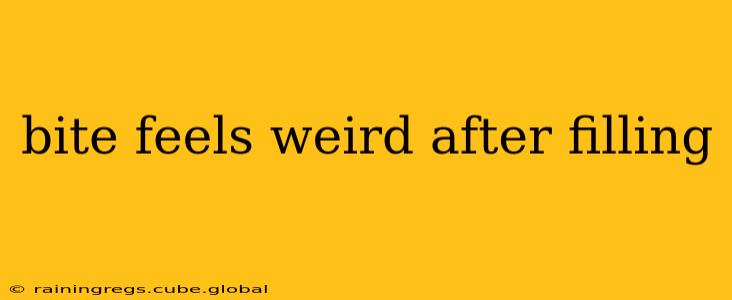A weird feeling after a dental filling is a common concern, and it's crucial to understand the potential reasons behind this discomfort. While sometimes it's simply a matter of adjustment, other times it could indicate a more serious issue requiring professional attention. This comprehensive guide explores various causes and provides helpful advice on what to do if your bite feels weird after getting a filling.
Why Does My Bite Feel Weird After a Filling?
The feeling of a weird bite after a filling is often due to the adjustment period your mouth needs to get used to the new restoration. The added material alters the height and shape of your tooth, slightly changing your occlusion (how your upper and lower teeth come together). This can lead to various sensations, including:
- Height Discrepancy: If the filling is too high, it can cause your bite to feel off, leading to discomfort or pain.
- Occlusal Interference: The filling might be interfering with the normal contact between your teeth, causing a feeling of pressure or a "high spot."
- Temporary Sensitivity: Your tooth may be temporarily sensitive to temperature changes or pressure due to the filling procedure itself. This usually subsides within a few days.
- Inflammation: Minor inflammation at the filling site could also contribute to a strange feeling in your bite.
- Underlying Issues: In rarer instances, a weird bite feeling might point to pre-existing issues like TMJ disorder (temporomandibular joint disorder) or other dental problems that were exacerbated by the filling process.
How Long Does the Weird Feeling Last?
The duration of the weird feeling varies considerably depending on the cause. In most cases, the discomfort resolves within a few days to a couple of weeks as your jaw adjusts to the new filling. If the feeling persists beyond two weeks, or if it's accompanied by significant pain or other symptoms, it's crucial to contact your dentist.
What Should I Do if My Bite Feels Weird After a Filling?
If your bite feels strange after a filling, here's a step-by-step approach:
- Wait and Observe: Give your mouth a few days to adjust. Often, the sensation diminishes on its own as your jaw adapts.
- Soft Foods: Stick to softer foods that require minimal chewing to avoid putting excessive pressure on the filling area.
- Over-the-Counter Pain Relief: If there's mild discomfort, over-the-counter pain relievers like ibuprofen or acetaminophen can help manage the symptoms.
- Contact Your Dentist: If the weird feeling persists for more than a week or two, or if it's accompanied by pain, swelling, or other concerning symptoms, schedule an appointment with your dentist immediately. They can assess the situation and determine the cause of the discomfort.
Can a Dentist Adjust My Bite After a Filling?
Absolutely. Your dentist possesses the skills and tools to adjust fillings that are causing occlusal interference or height discrepancies. They may use a special instrument to carefully grind down the filling until the bite feels comfortable and natural. This is a common and relatively simple procedure.
What if the Filling Falls Out?
If your filling falls out, it's important to contact your dentist as soon as possible. Leaving a cavity untreated can lead to further decay and more extensive dental work in the future.
Could this be a Sign of TMJ Disorder?
While a weird bite after a filling often indicates an adjustment issue with the filling itself, it can sometimes point to pre-existing conditions like TMJ disorder. TMJ involves problems with the temporomandibular joints that connect your jaw to your skull. Symptoms can include jaw pain, clicking sounds, and bite problems. If you suspect TMJ, discuss this possibility with your dentist, who can refer you to a specialist if needed.
By understanding the potential causes of a weird bite after a filling and following the steps outlined above, you can effectively manage the discomfort and ensure your dental health. Remember, regular communication with your dentist is crucial for addressing any post-filling concerns.
